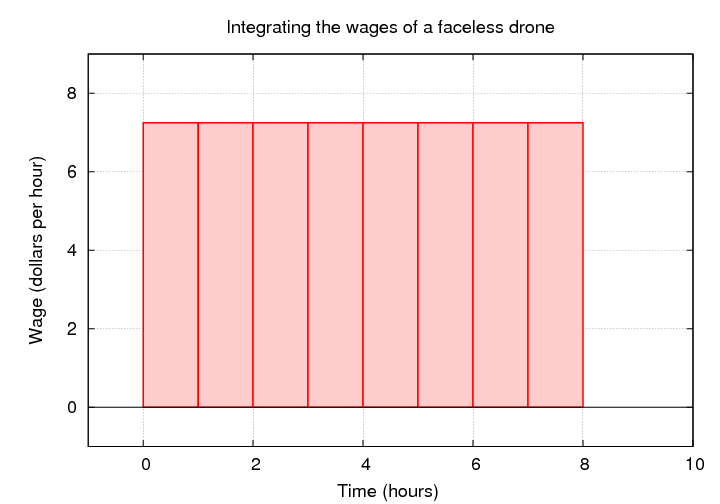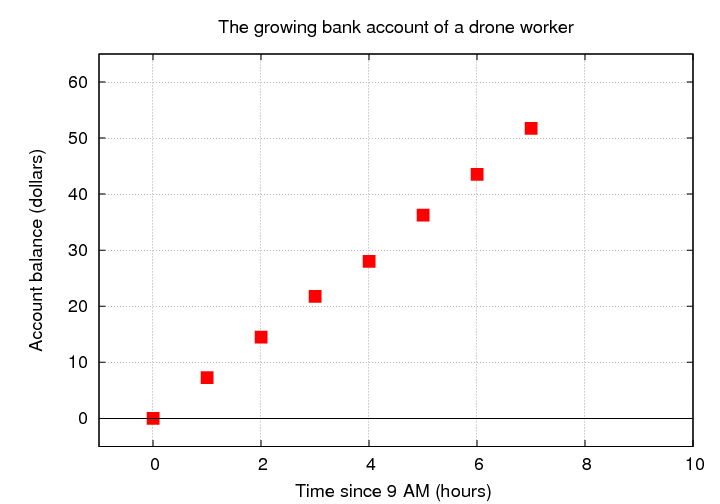 Copyright © Michael Richmond.
This work is licensed under a Creative Commons License.
Copyright © Michael Richmond.
This work is licensed under a Creative Commons License.
The notion of integration -- Part I
What is integration? The basic idea is pretty simple:
Integration is the act of adding up a bunch of little
actions
That's really all there is to it. The procedure of performing
this addition may at times involve a number of steps,
but when we integrate, all we're doing is adding together
a bunch of little pieces.
Working for minimum wage
Joe works at the local Burger Barn.
He is paid $7.25 per hour.
How much does Joe make during each 8-hour workday?
-
One way to solve this problem is to add up his
wages for each hour.
-
total over 8 hours = ($7.25/hour) * (1 hour)
+ ($7.25/hour) * (1 hour)
+ ($7.25/hour) * (1 hour)
+ ($7.25/hour) * (1 hour)
+ ($7.25/hour) * (1 hour)
+ ($7.25/hour) * (1 hour)
+ ($7.25/hour) * (1 hour)
+ ($7.25/hour) * (1 hour)
= $7.25 + $7.25 + $7.25 + $7.25 + $7.25 + $7.25 + $7.25 + $7.25
= $58.00
-
We can also look at this problem graphically.
-
We're adding up wages over time, so let's make a graph
on which the wages go on the vertical axis,
and time goes on the horizontal axis, like this:

The amount of money Joe makes during the first hour is given
by the area of the first red box: $7.25 per hour times 1 hour = $7.25.
If we add up the area of all the red boxes, we get Joe's total
for the day: $58.00.
Joe's bank account is growing
On Wednesday, when Joe goes into work, he's flat broke:
his bank account is completely empty. Zero. Zilch. Nada.
Fortunately, Joe's employer uses direct deposit, and makes updates
every hour. Let's look at Joe's bank account balance as
the day progresses.
At 9 AM, when Joe starts, his account has $0.00.
But at 10 AM, after one hour, his account is credited with $7.25.
We could make a table showing the bank balance as a function
of time:
Time Bank account balance
--------------------------------------------
9 AM $ 0.00
10 AM $ 7.25
11 AM $ 14.50
noon $ 21.75
1 PM $ 29.00
2 PM $ 36.25
3 PM $ 43.50
4 PM $ 51.75
5 PM $ 58.00
--------------------------------------------
Hmmmm. Joe's bank account is growing at a steady rate.
That's pretty obvious if we make a graph, showing the
account balance as a function of time.

What do we learn from this story?
We can express Joe's experience in ordinary speech:
If you put money into the bank, over and over again,
your account balance grows.
But we could be a bit more precise:
If you put money into the bank at a constant rate,
your account balance grows steadily.
If we step back and look at this example through the eyes
of a mathematician, we can describe it precisely using technical
language:
If you integrate a constant function,
you end up with a linearly increasing function.
We can even put it into mathematical symbols:

 Copyright © Michael Richmond.
This work is licensed under a Creative Commons License.
Copyright © Michael Richmond.
This work is licensed under a Creative Commons License.

 Copyright © Michael Richmond.
This work is licensed under a Creative Commons License.
Copyright © Michael Richmond.
This work is licensed under a Creative Commons License.

